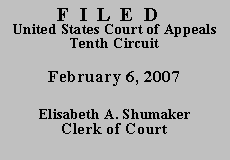

| EDDIE SANTANA, |
|
| v. | |
| CHEROKEE CASINO; OSAGE CASINO; CREEK NATION CASINO, |
On September 25, 2006, Appellant Eddie Santana filed a complaint in federal district court wherein he asserted Defendants use billboards and other forms of advertising to entice individuals to gamble at their casinos. Santana alleges he is currently being treated for a gambling addiction. He asserts Defendants' advertising unfairly targets individuals with gambling addictions, resulting in Defendants' unjust enrichment. Santana seeks damages in the amount of $9000, a sum he alleges he has lost gambling since 2002.
Santana based his claims on the Indian Gaming Regulatory Act ("IGRA"), 25 U.S.C. § 2701, and asserted the federal court had subject matter jurisdiction under 28 U.S.C. § 1331. The district court, however, dismissed the suit for lack of jurisdiction, noting Santana was attempting to pursue state law tort claims against Defendants through the IGRA and concluding the IGRA does not contain a private right of action in favor of an individual. See Hartman v. Kickapoo Tribe Gaming Comm'n, 319 F.3d 1230, 1232-33 (10th Cir. 2003) ("[N]owhere does IGRA expressly authorize private individuals to sue directly under the statute for failure of a tribe, a state, or the NIGC to comply with its provisions."). The court further concluded Santana could not rely on diversity jurisdiction since all parties are citizens of Oklahoma for purposes of 28 U.S.C. § 1332.(1)
This court reviews a dismissal for lack of subject matter jurisdiction de novo. See U.S. West, Inc. v. Tristani, 182 F.3d 1202, 1206 (10th Cir. 1999). Based on our review of the record, the pleadings, and the arguments asserted by Santana in his appellate brief, we conclude the district court did not err when it dismissed Santana's complaint for lack of subject matter jurisdiction. Accordingly, we affirm the district court's dismissal of Santana's action.
ENTERED FOR THE COURT
Michael R. Murphy
Circuit Judge
*.This order and judgment is not binding precedent except under the doctrines of law of the case, res judicata, and collateral estoppel. It may be cited, however, for its persuasive value consistent with Fed. R. App. P. 32.1 and 10th Cir. R. 32.1.
1.We note Santana has also failed to allege that the amount in controversy exceeds $75,000. See 28 U.S.C. § 1332; Laughlin v. Kmart Corp., 50 F.3d 871, 873 (10th Cir. 1995) (holding that the requisite amount in controversy and the existence of diversity must be affirmatively established in the pleading of the party seeking to invoke jurisdiction).